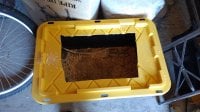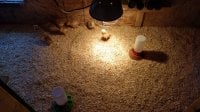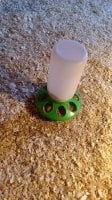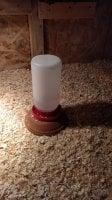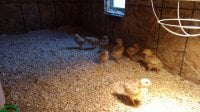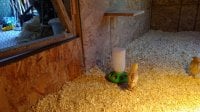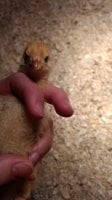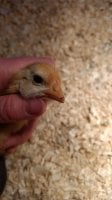Robyn Jefferson
Hatching
- Jun 7, 2017
- 8
- 0
- 6
Hi there!
My parents have gone away for three weeks, and I've been house sitting and taking care of their dogs and baby chicks for them. The chicks were brought home from the local feed store on May 26th so the are about two weeks old now.
Anyhow, I noticed on Tuesday evening that one of the chicks was missing the very tip of her upper mandable. There was no bleeding or anything. At this point they were being kept in a small storage tote with their heat lamp, and they were jumping around quite a bit so I thought perhaps it was getting cramped and she just injured herself. I moved the baby chicks out to the coop.
When I checked on them last night, there were two other chicks with slightly chippy beaks, not as severe, and when I went out this morning, the breakage on both of them is worse. All of the other chicks seem to have either a white patch or a blood coloured spot at the tip of their beaks, and it seems that all of the breakages have been at about that mark.
I know chicks are supposed to lose their egg tooth, but I'm thinking this is not normal, and perhaps the chicks have some sort of deficiency. I'm not entirely sure what to do. This is only my parents second time raising chicks, and they have never experienced this before. I know quite a bit about birds, as I own a parrot and budgies myself, but I haven't been able to find much information online in regards to baby chicks beaks breaking.
Is their anything I can give them to prevent further breakage, and will I need to file their beaks and round them off as they grow back?
Other than that, they seem normal. They are eating and drinking regularly, growing very well, love to cuddle and are very curious and active. They are constantly trying to jump and run and flap their wings.
I've attached two photos, one is of a chick with a broken beak, and the other (With the chicks at the waterer) is to show the blood coloured tips of the chicks with intact beaks.


Anyways, if anyone has any advice for me, I would very much appreciate it!
Thanks so much,
Robyn
My parents have gone away for three weeks, and I've been house sitting and taking care of their dogs and baby chicks for them. The chicks were brought home from the local feed store on May 26th so the are about two weeks old now.
Anyhow, I noticed on Tuesday evening that one of the chicks was missing the very tip of her upper mandable. There was no bleeding or anything. At this point they were being kept in a small storage tote with their heat lamp, and they were jumping around quite a bit so I thought perhaps it was getting cramped and she just injured herself. I moved the baby chicks out to the coop.
When I checked on them last night, there were two other chicks with slightly chippy beaks, not as severe, and when I went out this morning, the breakage on both of them is worse. All of the other chicks seem to have either a white patch or a blood coloured spot at the tip of their beaks, and it seems that all of the breakages have been at about that mark.
I know chicks are supposed to lose their egg tooth, but I'm thinking this is not normal, and perhaps the chicks have some sort of deficiency. I'm not entirely sure what to do. This is only my parents second time raising chicks, and they have never experienced this before. I know quite a bit about birds, as I own a parrot and budgies myself, but I haven't been able to find much information online in regards to baby chicks beaks breaking.
Is their anything I can give them to prevent further breakage, and will I need to file their beaks and round them off as they grow back?
Other than that, they seem normal. They are eating and drinking regularly, growing very well, love to cuddle and are very curious and active. They are constantly trying to jump and run and flap their wings.
I've attached two photos, one is of a chick with a broken beak, and the other (With the chicks at the waterer) is to show the blood coloured tips of the chicks with intact beaks.
Anyways, if anyone has any advice for me, I would very much appreciate it!
Thanks so much,
Robyn




 Welcome To BYC
Welcome To BYC
